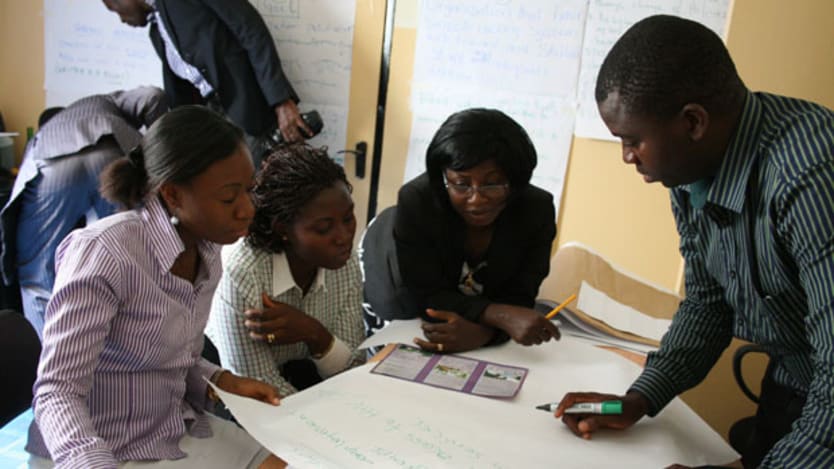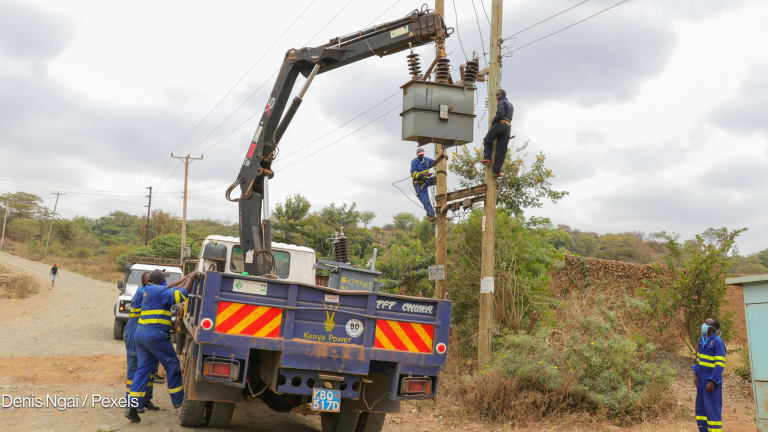Development done differently: A call to action for donors and local institutions

It’s time. Development needs a different approach to actually achieve desired results.
The players in the global development ecosystem — from donors to development practitioners to implementing partners — are increasingly recognizing this need.
But how can we work together to shift the paradigm of capacity development to sustainable performance improvement?
Many development practitioners are ready to call into question the value of traditional capacity development approaches and activities, which have been cornerstones of development programs for decades. The term “capacity development” can lead to a dead end and is limited in capturing what is truly needed for long-term development. Donors and development practitioners alike should focus instead on sustainable performance improvement. This shift towards performance improvement relies on donors and national and local institutions working together to create new expectations.
Donors can open up space for innovation and increased collaboration by changing what they ask from development practitioners and national and local institutions. In turn, this can give national and local institutions more power to take risks and implement new, unconventional approaches geared towards improving mission performance.
Here are four key takeaways that have emerged from Deloitte Consulting LLP’s decades of experience working alongside donors and national and local institutions.
1. Set indicators for outcome-level change.
Donors are asking practitioners and institutions to measure their results, but what exactly are we measuring?
Often, measurements are focused on trainings and other less defined outputs. Projects report on the number of information sessions held rather than reporting, for example, on how raising awareness of HIV prevention services can lead to increases in consistent antiretroviral use.
Donors can hold implementing partners accountable for outcome level change by requiring outcome-level capacity and performance level indicators through the solicitation or scope of work. By introducing these expectations upfront, donors facilitate a transition from outputs to outcomes.
The development community should continue to move towards learning that comes from embracing “failure.” Outcome-level indicators can be hard to achieve, but why should failure to meet them be accompanied by penalties? Donors can change the narrative by setting “stretch goals” — giving counterparts and development practitioners the opportunity to innovate and iterate on their innovations in an incremental process.
2. Align donor and counterpart objectives.
Change-makers know success is more likely when stakeholders are working towards the same end goals, but this knowledge has not been consistently institutionalized into how donors, development practitioners, and national and local institutions collaborate.
Donors can be more intentional about how interventions are geared towards a counterpart’s desired results. Many donors engage counterparts as a rule, but often, as projects progress, it is easy to lose focus on what the counterpart cares about.
Donors need to align their objectives with the objectives and mandates of counterparts from the start of projects and set internal controls to help ensure counterparts and donors are both achieving their goals. These intentions should be measured through indicators that implementing partners also use to measure their success.
If goals are aligned, there is a better chance of improving performance.
See more stories from Deloitte:
● A new paradigm for capacity development
● Forget capacity development — focus on sustainable performance improvement
● Follow the money: How to increase the transparency, efficiency and accountability of health care spending
3. Employ sustainable change management practices.
Change can be a difficult process, even when we are all pointing our efforts in the same direction. Donors can employ human capital solutions, such as change management, to promote sustainable change within an organization.
But what exactly is change management? In essence, it is a widely recognized discipline for identifying and implementing activities that give change the greatest chance of success.
In practice, this could mean a change readiness assessment at the launch of an intervention to identify areas within an organization that may be more resistant or adaptive to change, or developing plans to anticipate stakeholders’ responses to change so that communication is consistent as change is implemented.
By equipping leaders to lead and manage change, results can be sustained beyond donor engagement.
4. Develop strong local leaders and managers to drive change.
A major part of making and sustaining change is empowering and developing local leaders and managers who will drive country ownership. Without strong leaders and managers, interventions fail to create self-sufficient institutions.
Donor agencies recognize that strong leadership and management are critical to achieve program sustainability and growth in emerging markets, but they face challenges in consistently programming for leadership development.
Successful approaches to leadership development employ data-driven interventions to address leadership needs at the individual, organizational and systemic level. This may include data collected through skill gap analyses, 360-degree assessments, establishing career paths, and individual coaching sessions to put counterparts in the driver’s seat.
As a development community, we are at a turning point.
Now more than ever before it is crucial that our activities are oriented towards sustainability and empowerment. Governments around the world seek new ways to achieve efficiency — to do more with less. These activities inspire incremental shifts in how we “do development,” shifts that have the potential for huge impact.
Together, we are building a fundamental change in the way we think about “capacity development” and “capacity building,” throwing old language and paradigms out the window, and embracing a culture of stretch goals, shared vision and priorities, ambitious change, and true local leadership.
Deloitte Consulting LLP’s Federal Human Capital Practice is embracing the shift towards outcomes and performance. Deloitte and Devex collaborated in an exclusive webinar in November 2014 to discuss what the global development community has learned so far and how to create the environment for sustainable performance improvement.
We hope that you will participate in this continuing conversation by sharing your thoughts on these four take-aways and on the move towards sustainable performance improvement.
This is the first of three exclusive guest columns that explore how sustainable performance improvement, counterpart empowerment and data-driven choices make and sustain a change to the way development is done. For more on capacity development and the shift to sustainable performance improvement, read the article featured on Devex in November 2014, entitled "Forget capacity development — focus on sustainable performance improvement."
Join the Devex community and access more in-depth analysis, breaking news and business advice — and a host of other services — on international development, humanitarian aid and global health.
Search for articles
Most Read
- 1
- 2
- 3
- 4
- 5










